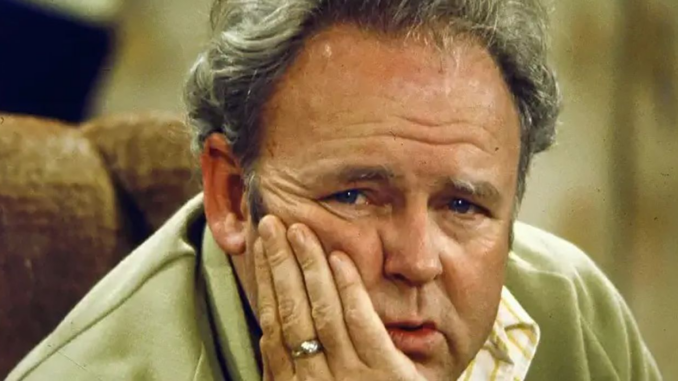
When All in the Family premiered in 1971, it quickly became one of the most talked-about shows on television. Its blend of comedy and social commentary was revolutionary for its time, addressing issues like racism, sexism, and class struggles in ways that had never been seen before on TV. But while the show ended its original run in 1979, its impact has continued to reverberate through the television landscape. Decades later, All in the Family remains one of the most influential sitcoms in history, shaping the way modern TV tackles social issues and redefines the family unit.
Breaking New Ground:
Before All in the Family, most sitcoms followed a predictable formula: the idealized, nuclear family, with clear moral lessons and comedic misadventures. Shows like The Dick Van Dyke Show and Leave it to Beaver presented a sanitized view of family life, where conflicts were resolved quickly and neatly. But All in the Family threw this formula out the window.
With its biting humor and sharp social commentary, All in the Family challenged viewers to confront the difficult truths about American society. It wasn’t afraid to tackle issues like racism, sexism, the Vietnam War, and civil rights—issues that were being fiercely debated in the real world at the time. By doing so, it helped push the boundaries of what was acceptable on television and paved the way for more complex, socially-conscious sitcoms to follow.
Spin-Offs and Influence on Other Shows:
The impact of All in the Family was not limited to its own run. The show spawned several spin-offs that carried forward its legacy of social commentary. The Jeffersons, which followed the lives of an African American family who had moved “upstairs” to a wealthier part of town, explored issues of race and class. Maude, which focused on the character of Maude Findlay, a feminist and political liberal, tackled issues like abortion and women’s rights.
These spin-offs were not just products of their time; they were direct results of All in the Family‘s willingness to address difficult topics. Without the success and cultural relevance of All in the Family, shows like The Jeffersons and Maude may never have had the platform to reach audiences or tackle controversial issues as boldly as they did.
Modern TV Shows Influenced by All in the Family:
Today, it’s impossible to ignore the influence All in the Family has had on modern television. Shows like The Simpsons, Family Guy, and Arrested Development all owe a debt to All in the Family in their willingness to address political and social issues through humor. These shows, much like their predecessor, use satire to tackle everything from race and class to politics and gender.
All in the Family showed that television could be both funny and meaningful—that humor could be used as a tool for social critique. In this sense, the show has shaped the way we consume entertainment today, making it possible for modern TV to take on bold subjects while still keeping audiences entertained.
The Enduring Relevance:
While All in the Family aired in the 1970s, its themes remain relevant today. Issues like racism, inequality, and the tension between generations continue to dominate political and cultural conversations. In an era where political polarization is at an all-time high, All in the Family reminds us that humor can be a way to bridge divides and open up important conversations.
As much as we’ve changed since the 1970s, All in the Family proves that the struggles at the heart of the show are still with us. It reminds us that even in a world that is constantly shifting, the power of laughter and honest conversation can help us navigate the most difficult issues.
Conclusion:
All in the Family may have ended its run decades ago, but its legacy lives on. By breaking down the barriers of what television could tackle, it paved the way for future shows to address the complexities of modern life with humor and insight. Its influence is still felt today in the way that sitcoms engage with social and political issues. All in the Family was more than just a television show—it was a cultural milestone that changed the way we think about entertainment, society, and the role of comedy in our lives. Its legacy is a testament to the power of television to reflect and challenge the world around us.
